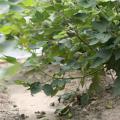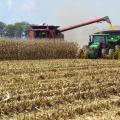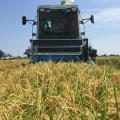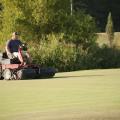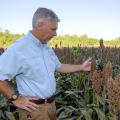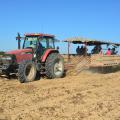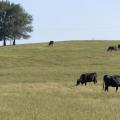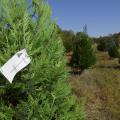Crop Report from 2016
STARKVILLE, Miss. -- Wet, cloudy weather has put a lot of cotton bolls on the ground, but experts still expect an above average crop from Mississippi’s cotton acreage.
Darrin Dodds, cotton specialist with the Mississippi State University Extension Service, said experts knew boll loss was coming after all the recent rain.
STARKVILLE, Miss. -- Wet, cloudy weather through much of August has prevented corn from drying as it should before harvest, possibly cutting into farmers’ profit margins.
Erick Larson, corn specialist with the Mississippi State University Extension Service, said corn matures at 30 percent moisture. Prices are docked if growers deliver corn with a moisture content above 15.5 percent, which is the standard suitable for corn grain storage.
STONEVILLE, Miss. -- Cue the song “Anticipation” for Mississippi’s rice growers because that title and chorus perfectly describe this point in the season.
“The majority of our rice fields are drained, and we are just waiting for conditions to stay dry long enough for harvests,” said Bobby Golden, Extension rice specialist based at the Mississippi State University Delta Research and Extension Center in Stoneville. “The weather has made us about 10 days later than normal. Harvest activity should increase rapidly in the first days of September as long as we stay dry.”
STARKVILLE, Miss. -- Demand for turfgrass in Mississippi is stabilizing as housing starts trend up nationally.
Jay McCurdy, turfgrass specialist with the Mississippi State University Extension Service, said favorable weather, coupled with optimism in the national housing market, is welcome news to the state’s sod growers.
STARKVILLE, Miss. -- Grain sorghum acres are very low in the state, a response to prices returning to their usual range and sugarcane aphids continuing to be a scourge to the crop.
VARDAMAN, Miss. -- After two challenging years in Mississippi sweet potato fields, farmers are hoping for a problem-free harvest over the next few weeks.
Stephen Meyers, Extension sweet potato specialist based at the Mississippi State University Pontotoc Ridge-Flatwoods Branch Experiment Station, said growers are cautiously optimistic as harvest begins.
STARKVILLE, Miss. -- News that China is lifting a 13-year import ban on U.S. beef is not helping prices as much as some cattlemen would have hoped.
Brian Williams, agricultural economist with the Mississippi State University Extension Service, said the news has not resulted in any long-term impact on cattle markets.
STARKVILLE, Miss. -- Increasing markets for local foods and succulent plants are encouraging green industry suppliers to offer new products for horticulture customers.
STARKVILLE, Miss. -- Mississippi's October weather has offered more than enough of the most vital tonic pumpkins need for growth: full sunlight.
But the state has lacked another key element: water. Fortunately, the majority of the state’s pumpkin fields are irrigated, so the ongoing drought has had little effect on this year’s plentiful harvest.
However, nonirrigated pumpkin acreage has seen better days, said Casey Barickman, an assistant professor at the Mississippi State University North Mississippi Research and Extension Center in Verona.
STARKVILLE, Miss. -- A game-changing insect caused significant problems in many Mississippi soybean acres, but good management allowed growers to finish the year with an average crop.
The U.S. Department of Agriculture estimated that by Oct. 23, Mississippi farmers were 92 percent finished harvesting the state's soybean crop, which covered about 2.03 million acres this year. Insect and disease pressures made the effort challenging, but USDA predicts growers will harvest a state average of 48 bushels an acre.
SAUCIER, Miss. -- Larry Haley has no problem selling his Christmas trees each November.
In fact, he has to set a limit on how many he can spare and stop once he reaches that number to maintain a steady inventory. His target this year is about 300 choose-and-cut trees before Thanksgiving.
"A couple of years ago, I got in trouble because I sold too many in one season and almost depleted the next year's stock," he said. "Last year, we started holding fields back for a season so that doesn’t happen again."

